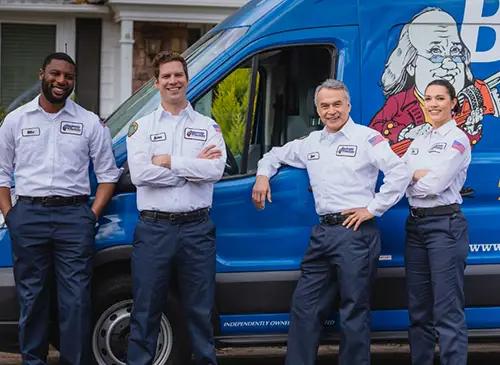 Nearly 90% of homes throughout the nation have standard, storage-based water heaters. Also known as tank water heaters and tank-based water heaters, these units heat water and store it for future use. Capable of holding between 20 and 100 gallons at once, tank water heaters use energy around the clock.
Nearly 90% of homes throughout the nation have standard, storage-based water heaters. Also known as tank water heaters and tank-based water heaters, these units heat water and store it for future use. Capable of holding between 20 and 100 gallons at once, tank water heaters use energy around the clock.
Even with insulation, the hot water inside their tanks gradually loses heat. Tankless water heaters offer a sleek, modern, and significantly more efficient alternative. Tankless water heaters heat water on demand. This eliminates standby energy use and allows for a seemingly unlimited hot water supply. At Benjamin Franklin Plumbing, we want locals to know how these two water heater types measure up.
Tankless Water Heaters Have Longer Lifespans
Constantly heating and reheating water is tough work. Tank water heaters sustain more wear than tankless models as a result. Much of this wear comes from calcium, magnesium, and other dissolved minerals in hard water. These minerals settle on tank bottoms and heating elements. The resulting sediment gradually decreases the efficiency of tank water heaters. It can also lead to loose, leaky connections, and cracks in glass tank liners.
When properly sized and installed, a tankless water heater can last up to 20 years. On average, storage-based water heaters last just 12 years. They also require more maintenance throughout their service lives.
Hot Water Supply Issues
An 80-gallon storage-based water heater can only hold 80 gallons of hot water at once. If you have a large family, you might run out of hot water before everyone has the chance to take a hot shower. This is especially true if you run your dishwasher and washing machine just before or during bath time.
Tankless water heaters aren’t subject to the limitations of tanks. If you need 100 gallons of hot water, a tankless water heater can produce them as needed. However, these units can’t service multiple taps or plumbing-connected appliances at the same time. For instance, although everyone in your home can enjoy a piping hot shower, you can’t run your dishwasher or washing machine while they do so. If you do, some of your active hot water taps will run cold.
Delays in Hot Water Production
If you have a tank water heater with a capacity that’s just right for your household, you won’t have to wait long for hot water after turning on your tap. Given that storage-based water heaters constantly reheat the water in their tanks, they almost always have hot water readily available.
With a tankless water heater, your hot water taps will release cold water for several seconds after they’re turned on. The wait for hot could prove even longer if you live in an area where the groundwater is especially cold.
You Might Need More Than One Tankless Water Heater
Tankless water heaters cost about 40% more than their storage-based alternatives. Some households also require two tankless water heaters to keep up with their hot water demands. This is often the case with large, active households that regularly use multiple fixtures and plumbing-connected appliances at once.
Tank Water Heaters Require More Space for Storage
Often installed in basements, garages, or laundry rooms, tank water heaters take up valuable real estate in smaller homes. In comparison, tankless water heaters have slim, inconspicuous profiles and a fresh, modern look. Although plumbers often install tankless water heaters in garages, basements, and utility rooms, they’re compact enough for bathroom, pantry, and attic installations.
Poor Maintenance and Property Damage
When homeowners neglect water heater maintenance, tank water heaters can develop leaks or their tanks might rupture. If you’ve ever had a storage-based water heater empty its contents onto your floors, you already know just how destructive 20 to 100 gallons of hot water can be. Although tankless water heaters aren’t impervious to leaks, wear-related damage, or damage caused by insufficient maintenance, these appliances don’t hold large amounts of water and can’t cause major floods.
Are Tankless Water Heaters the Best Choice?
According to the U.S. Department of Energy (DOE), tankless water heaters can be up to 34% more efficient than their alternatives in homes that use less than 41 gallons of hot water each day. However, for larger households with consistently high hot-water demand, sufficiently large storage-based water heaters are often the best choice.
Both appliance types heat water effectively and both have their own range of benefits and drawbacks. At Benjamin Franklin Plumbing, we can assess factors like your household size, hot water needs, budget, and targeted storage area to find the perfect water heater for your home.